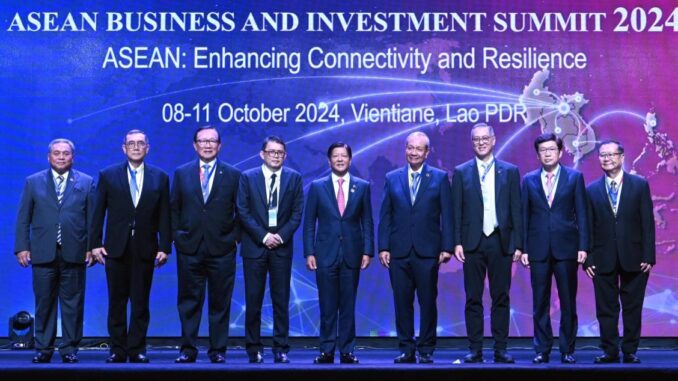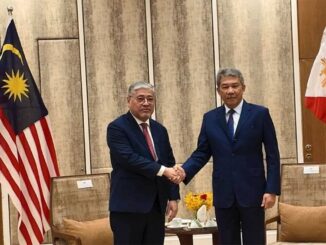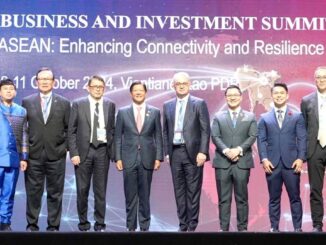
VIENTIANE, Laos — President Ferdinand Marcos Jr. invited investors to explore opportunities in the Philippines as he made a pitch for the country as “an ideal hub for smart and sustainable manufacturing.”
Speaking before the Asean Business and Investment Summit here on Wednesday, Marcos said the Philippines is pursuing aggressive development in infrastructure, manufacturing, agriculture, and digital connectivity.
“Let me put on my salesman’s hat for just a while and invite you to explore the investment opportunities that are on offer. We are targeting industries like green metals, battery manufacturing, energy equipment, data centers, and agribusiness,” he said.
BUSINESS SUMMIT President Ferdinand Marcos Jr. poses with Philippine business leaders including Go Negosyo founder Jose Ma. ‘Joey’ Concepcion III and Michael Tan at the Asean Business and Investment Summit on Oct. 9, 2024. PPA POOL
The President said the Philippine manufacturing sector continues to flourish despite global challenges, citing indicators such as the sustained Purchasing Managers’ Index growth.
The chemicals industry, he added, is one of the largest sub-sectors in the manufacturing industry, a major pillar supporting various sectors like agriculture, automotive, cement, creative, construction, energy, health, and pharmaceutical.
“We look at this as a major contributor to economic growth and job generation in the foreseeable future,” Marcos said.
To achieve these goals, Marcos said the government enacted key reforms such as the Public-Private Partnership Code, the Internet Transactions Act, and Executive Order 18, series of 2023.
He said that the government was also pursuing the enactment of other key legislations like the Corporate Recovery and Tax Incentives for Enterprises to Maximize Opportunities for Reinvigorating the Economy (Create More) Act, which is anchored on the Create Act of 2021 to further strengthen fiscal and non-fiscal incentives in strategic industries.
“So, to boost the country’s competitiveness in the global markets, this measure shall simplify approval processes and the permitting processes as well, streamline the value-added tax refund system, and enhance tax incentives in different industries,” Marcos said.
Connectivity
The President said that developing connectivity and resilience within Asean “is more than just optimizing value chains — it is about upholding inclusive growth that uplifts every region, every community, and every citizen.”
“So, let us be the architects of an interconnected, integrated, and progressive Asean. Let us build bridges that transcend borders, shaping a future where every member of the Asean family has a path to success,” Marcos said.
“And as we advance from this summit, I look forward to witnessing the unwavering determination of our regional brothers and sisters as we shape a narrative and an environment where collaboration trumps isolation, innovation eclipses stagnation, and our collective aspirations illuminate the path toward a brighter future,” he added.
Meanwhile, Go Negosyo founder Jose Ma. “Joey” Concepcion III said most of the member states in the regional bloc were dependent on the economy; therefore the need to reskill workers.
In a separate interview with the Philippine media delegation at the sidelines of the Asean Business and Investment Summit here, Concepcion said he had attended a number of meetings at the Asean Summit to push for the welfare of micro, small and medium enterprises (MSMEs).
“In general I would say the Asean countries, most of them, are heavily dependent on the economy because we all realize that… especially those who are not as fortunate as successful countries like Japan and Singapore, countries like the Philippines, Cambodia, Lao, Myanmar, Vietnam, it’s very important to focus on small entrepreneurs to get them to grow, scale up,” he said.
Concepcion said a number of agreements are expected to be signed during the President’s visit, including a deal on the availability of land.
The Asean Business and Investment Summit is a major regional annual gathering that brings together world leaders, Asean representatives, and other relevant stakeholders to discuss the pressing issues in the region.
It also explores ways to ensure equal and sustainable distribution of the benefits of Asean’s thriving economy.





Be the first to comment